It is my personal opinion that American culture often neglects, forgets, and rejects the importance of quality food, well grown and well prepared. And that’s a damn shame. Fortunately, some people do care, and for those people, there are farmers markets.
In an April blog post, I discussed the sustainability of my food choices: I was buying mostly organic goods from the grocery store. Since then, summer struck and with it weekly Sunday Farmer’s Market at the south end of Main St. Since that first one, I’ve gone every Sunday to get my produce, which amounts to about half the food I eat (though only about a quarter of the money I spend on food.) The only thing more sustainable would be raising my own fruits and vegetables.

What makes a farmers market so sustainable you ask?
- You know the food is fresh and local (within 250 miles) and that means more flavor and more nutrition than those 5000 miles Australian apples (which I found in the supermarket yesterday).
- You can ask how, who, and where it’s produced and while perhaps not certified USDA, most growers at farmers markets grow organically.
- Your money goes directly to the farmer, supporting the better quality food you desire, as well as keeping your money in your community.
- Your farm stand friends become part of your community…

 In August, I went on vacation for two weeks. When I returned to Breckenridge and went to the market, my friends Stanley and Alicia at the Miller Farm Stand remarked, “Ahh where were you? You’ve been gone for two weeks! Last Sunday there we were late in the day, wondering ‘Where is our smiling friend? We’ll wait just a few more minutes. He needs his vegetables!’” And when you’re that regular, loyalty doesn’t go unrewarded – the last three Sundays, Stanley has given me an extra bag with peaches, pears and blueberries.
In August, I went on vacation for two weeks. When I returned to Breckenridge and went to the market, my friends Stanley and Alicia at the Miller Farm Stand remarked, “Ahh where were you? You’ve been gone for two weeks! Last Sunday there we were late in the day, wondering ‘Where is our smiling friend? We’ll wait just a few more minutes. He needs his vegetables!’” And when you’re that regular, loyalty doesn’t go unrewarded – the last three Sundays, Stanley has given me an extra bag with peaches, pears and blueberries.For people who think they lack the time to go to the farmers market, there are CSA (Community Supported Agriculture) programs, where you buy a share of crops and receiving a weekly shipment of produce, which can force creativity with items you might not normally purchase.
One final thing I love about the farmers market is watching the seasons change with the available harvest. In the beginning of the summer, there were cherries, plums and strawberries, gradually replaced by peaches and pears. Fall arrives with the presence of all sorts of squash – spaghetti, acorn, butternut. Sadly, only two weeks remain in the market season, but my memory of summer in Breckenridge will always be accompanied by my Sunday trip to the Farmer’s Market.



